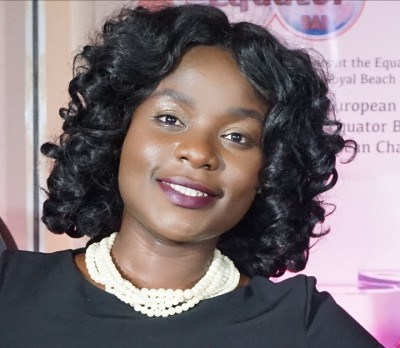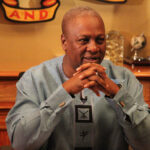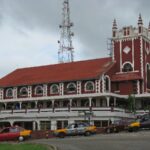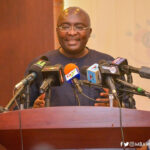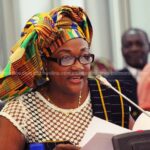Had it been someone else at the presidency who made the comment Louise Carol Donkor made about foot-soldiers, I doubt we would have such seen such visceral outrage. In fact, if a man had said the same thing, the people who took offence at her comment might have laughed or looked away. If a less visible, non-threatening woman had said the same thing, no trolling. No one would have been so triggered to campaign for her to be fired and her suspension, unlikely as that would have been, wouldn’t have evoked so much joy among so many. But Louise Carol Donkor isn’t just anybody; she is a woman, a known feminist who spent the past year challenging sexist and traditional norms on social media. Together with PepperDem, the group she co-founded, they have made it uncool to be sexist online. And like all feminists online, they have made powerful enemies and earned the ire of many foot-soldiers of patriarchy. This faux rage over her comment was merely payback for her refusal to back down.
It says a lot about the government that this was the issue that got swift action. Imagine if they had deployed the same swiftness during the galamsey crisis. It took a media campaign to force the government to commit to opening the 650-bed University of Ghana Medical Centre which has been closed for 17 months. Perhaps the UGMC issue was too complicated for the kind of swiftness deployed to get Louise Carol Donkor suspended.
What about Kennedy Agyapong’s embarrassing, and perhaps, criminal comments about Anas Aremeyaw Anas? The Assin North MP, who is a member of the NPP, went on live radio to threaten murder and incite violence against Anas Aremeyaw Anas. There was no word, not a peep, from the presidency when he called the Majority leader in Parliament a loser. There was no sanction for the official who said the military should have shot Reginald Sekyi-Brown for protesting in the face of the First Lady.
A little background. Last week a section of Ghanaian society (read: NPP supporters on social media) secured a significant victory. They got the government to suspend their current arch-enemy, Louise Carol Serwaa Donkor, for making disparaging comments about them on social media. Not just that, she was ordered to “render in writing, an unconditional apology and commit to good behaviour.” Louise Carol Serwaa Donkor, a policy and communication analyst at the presidency, triggered NPP foot-soldiers with this comment: “You can’t reason with foot-soldiers. It’s like tribalists.” This was in response to a friend’s post that said, “As a general rule I do not speak to foot-soldiers.” Even though neither Carol nor her friend named a specific group of foot-soldiers, NPP took offence and trolled her till she apologised. The apology wasn’t even enough to soothe their hurt feelings. They had to push for her suspension.
None of this is surprising. The NPP isn’t known for its capacity to handle internal (or external ) dissent or criticism. In 2013, national executives suspended Charles Wereko Brobby, a founding member, for publicly criticising the party. What happened to Louise Carol is worse, she didn’t attack the NPP or NPP foot-soldiers. What she said is what everyone thinks about foot-soldiers in general. Many Ghanaians see foot-soldiers as the “violent” fringe of the supporters who do the work politicians and the money guys find undignifying. The people who call into radio shows to sway national conversations, spin-doctors on social media, and trolls who harass anyone who criticises their party. Foot-soldiers do these things in hopes that their party’s victory will bring them contracts, jobs, money, trips abroad, cars and good life on taxpayers’ money. How do you reason with people whose survival depends on politician’s stay in office?
The truth is, the people who attacked Louise Carol also resent her for getting a job in government. As many of them argued, when they were working to get the NPP elected, Louise Carol Donkor was away getting a PhD. She wasn’t there when they were feeding multitudes on behalf of the party, neither was she there when they went door to door to evangelise. Worst of all, she didn’t even use her social media pages to campaign for the NPP. In Ghana’s political system, where politicians trade public goods for political support, Louise Carol Donkor is reaping where the foot-soldiers sowed. But this wasn’t the reason they attacked her. Think about it: When was the last time Ghanaian foot-soldiers turned on a party member for a non-offence? This is all about Louise Carol’s work with PepperDem. Even before she got her job at the presidency, they were praying for a way to silence her and undermine her voice. How dare she question long-held norms that privilege Ghanaian men?
It is also about women in politics. What happened to Louise Carol is the standard treatment for women in Ghanaian politics who make mistakes – they’re quickly thrown under the bus. Former President John Mahama government fired Victoria Hammer for saying in a private conversation that she planned to make a million dollars in government. As I said then, no one should allow a person with such intentions close to a government office. But some men in the Mahama government did and said worse and were not fired. Baba Jamal told workers at the Ministry of Information to lie to Ghanaians on behalf of the government, the tape leaked but he remained in office until the NDC left office. Dzifa Attivor was sacrificed for the bus branding scandal even though a careful reading of the entire saga showed that people (all men) higher up in John Mahama’s administration were involved. For women in Ghanaian politics, a misstep means being humiliated by the people who are supposed to protect you.
For instance, three weeks ago, Anita Desosoo NDC’s National Vice Chairperson, knelt and apologised to the founder of the NDC, Jerry John Rawlings on behalf of executives of the party. Rawlings had a fractious relationship with the executives of the party during John Mahama’s term in power. Newspaper records will show that it was mostly the male executives who treated Rawlings with disdain and isolated him but it was Desosoo, a woman who knelt and apologised for their sins in public. And what did she get for her grand attempt at reconciliation? Humiliation. Instead of responding to her plea, John Rawlings told her to stop bleaching.
And we wonder why there are so few women in Ghana politics. It is costly for those who dare. They face sexist attacks and risk disgrace if they fall out of favour with party hierarchy. Out of 216 heads of local assemblies, only 36 are women. Our country’s 275-member Parliament has only 30 women. Why should any woman risk her humanity and mental health in a space designed for men by men to keep men in power? Even though political parties, just like the church, wouldn’t survive without women, those who make it to the top have no power. They’re just ornaments easily discarded by the powerful men on whose mercies they exist.
In January 2018, President Akufo-Addo declared his support for the United Nations’ #HeForShe campaign to promote gender parity, noting that “women’s equality with women is a prerequisite for development.” But by suspending Louise Carol Donkor to appease foot-soldiers, President Akufo-Addo has rendered his words meaningless. And instead of inclusive and interest-based democracy, the government plans to prioritise feelings and needs of foot-soldiers above all else, which also not good for a president who describes himself as a “consummate Democrat.” Is it even a democracy if there is no dissent and women’s voices are absent?

